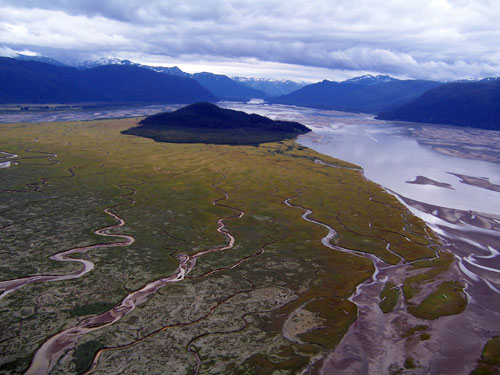
Mount Polley remembrance ceremony on Stikine River
July 25, 2015
Saturday PM
(SitNews) Wrangell, Alaska - One year after Canada’s worst mining disaster – the August 4, 2014 Mount Polley tailings dam collapse in British Columbia – Alaska Natives and First Nations will mark the tragic event with a ceremony in Wrangell to bless the Stikine River, a major transboundary salmon near a newly opened Canadian mine, Red Chris. Red Chris is one of several mines that B.C. is planning to build or reopen in salmon-producing watersheds that drain into Southeast Alaska.
The Wrangell Cooperative Association, a federally recognized tribe, will host the event on August 2. It will take place on Chief Shakes Island in the heart of Wrangell harbor, just south of the mouth of the Stikine. A procession through downtown Wrangell will kick off the day’s activities starting at 1 p.m. A blessing of local waters in front of the historic Tribal House will follow, along with traditional songs from tribal members, and remarks by guest speakers, including Iskut First Nation spokesperson Oscar Dennis, and Mining Team Coordinator Jacinda Mack, who witnessed the Mount Polley disaster first-hand.

Lower Stikine River
Photograph courtesy US Forest Service
A working dinner will follow the ceremony, allowing tribal and government officials, conservation organizations, and concerned community members the opportunity to ask questions, voice concerns, and strategize next steps for working together.
“I hope the August 2nd ceremony highlights how concerned people are on both sides of the border about the major risks to the Stikine River and other transboundary rivers from large-scale and risky mine developments in British Columbia,” said Dennis. “I look forward to meeting those in Wrangell who have joined the fight to protect our watersheds.”
An independent investigation of the 2014 Mount Polley disaster concluded that design flaws were to blame for the massive tailings dam failure, which sent an estimated 6.6 billion gallons of toxic tailings into waters leading to the Fraser River, one of Canada’s most important salmon rivers. The expert panel report that emerged from that investigation pointed to foundation weaknesses, overtopping the dam, and internal erosion of the tailings pond. The accident highlighted how lax B.C. mine regulations are and how they cannot be trusted to protect transboundary watersheds where at least 10 major mines are in various stages of development, threatening Southeast Alaska’s billion-dollar seafood and tourism industries, indigenous communities, and quality of life.
This month, Imperial Metals Corp. received a restricted permit from the B.C. government to reopen the Mount Polley mine utilizing an alternate tailings operation. The company expects to commence production next month with limited staff and operations. Imperial Metals Vice-President Steve Robertson stated that the intention is to have Mount Polley fully staffed in a year.
“Our concerns and demands for long term plans and clean up have not been fully addressed prior to a partial re-start at Mount Polley Mine,” said Mack. “The public and many of our members are quickly losing faith in this process. It appears that it is simply business as usual. There have been no fines, no criminal charges, no approved long-term water treatment and management plan, and the company still gets permitted to operate. It’s a disgrace.”
The Red Chris mine in the Stikine headwaters is operated by the same company that owns Mount Polley, Imperial Metals. It is larger than Mount Polley and its waste is acid-generating in nature, making Red Chris an even greater threat to Southeast Alaska waters. Since 1969, when tailings dam permits became required, an average of two B.C. dams have failed every decade, according to the Report on Mount Polley Tailings Storage Facility Breach conducted by the Independent Expert Engineering Investigation and Review Panel. The report predicts that unless mining regulations and practices are reformed, B.C. can expect two tailings dam failures every ten years.
“It is too soon right now to know what the long term salmon impacts will be,” said Mack. “Many people didn't fish at all for salmon last year, afraid of the contamination. It was described as a feeling of a death in our community when the disaster happened. We can never go back to the way it used to be.”
“This is a tremendous opportunity for the Tribe and Wrangell to host such an event,” said Aaron Angerman, Wrangell Cooperative Association Tribal Administrator. “Ceremonies like these should be happening in all Southeast Alaska communities, especially those surrounding transboundary rivers. Let your voices be heard and let’s get the International Joint Commission to enforce the Boundary Water Treaty and protect our shared waters.”
The Stikine is a transboundary river flowing hundreds of miles from Northern British Columbia to its mouth near the community of Wrangell. The Stikine watershed encompasses more than 20,000 sq. miles and is a world-renowned sanctuary for bald eagles, waterfowl, shorebirds, moose, bear and other wildlife, as well as one of the most abundant sources of salmon in the state of Alaska. The largest tributary of the Stikine is the Iskut River, on which the Red Chris mine is operating.
The Wrangell Cooperative Association welcomes the public to attend the August 2nd ceremony.
Edited by Mary Kauffman, SitNews
Source of News:
Wrangell Cooperative Association
http://www.shakesisland.com
Publish A Letter in SitNews
Contact the Editor
SitNews ©2015
Stories In The News
Ketchikan, Alaska
|
Articles &
photographs that appear in SitNews may be protected by copyright
and may not be reprinted without written permission from and
payment of any required fees to the proper sources.
E-mail your news &
photos to editor@sitnews.us
Photographers choosing to submit photographs for publication to SitNews are in doing so granting their permission for publication and for archiving. SitNews does not sell photographs. All requests for purchasing a photograph will be emailed to the photographer.
|
|

